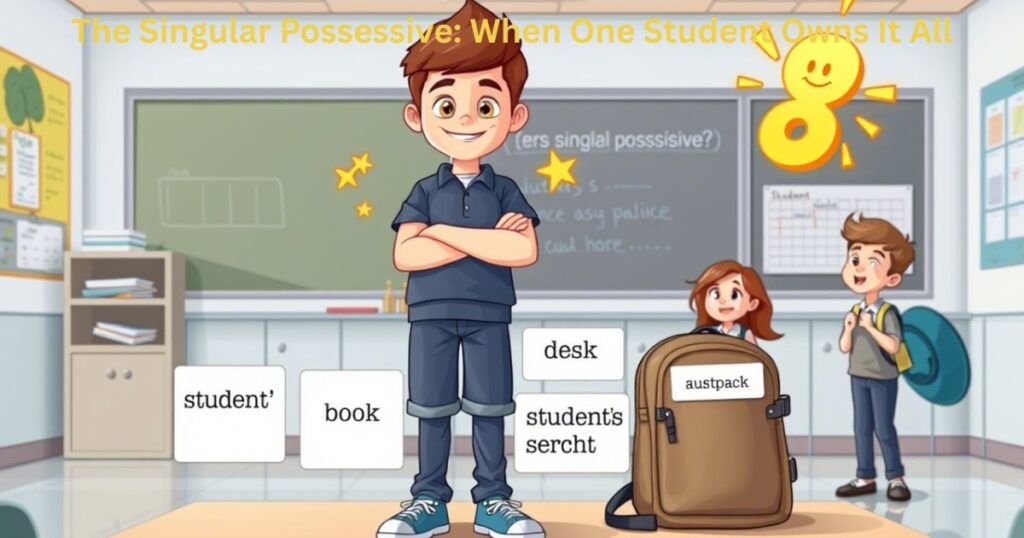Apostrophes can be tricky, especially when deciding between Student’s, Students’, or Students. Many writers struggle to know when to use the apostrophe and when to leave it out. The difference matters because it changes the meaning of a sentence. For example, Student’s shows something belonging to one student, while Students’ refers to ownership by many students.
Sometimes, you just need Students without any apostrophe to talk about more than one student. Understanding how to use Student’s, Students’, or Students correctly helps you communicate clearly and avoid confusion. Whether you’re writing about a student’s backpack or the students’ projects, using the right form of these words makes your message stronger. This guide will break down the rules and show you how to use Student’s, Students’, or Students with confidence in everyday writing.
The Singular Possessive: When One Student Owns It All

When we use student’s, we are talking about one student who owns something. The apostrophe goes before the “s” to show ownership. For example: “The student’s backpack was heavy with books.” That means one student owns the backpack. You could also say, “The student’s pencil rolled off the desk,” or “The student’s essay was well-written.” All of these show that a single person is involved.
Think about this: if one teacher praises a student for their great contribution to a class project, the correct form is, “The student’s contribution was excellent.” It’s clear that only one person did that work. Misplacing the apostrophe in this case could change the meaning or confuse your reader. If you’re writing about one person’s responsibility or one person’s frustration, this is the form you need.
Read this Also: Next Friday vs. This Friday: A Complete Guide to Avoiding Calendar Confusion
The Plural Possessive: When Many Students Share Ownership
Now let’s talk about students’, which is used when more than one student owns something. In this form, the apostrophe comes after the “s”. For example: “The students’ projects were shown at the school fair.” This means that many students had projects, not just one. You might also see sentences like, “The students’ assignments were due today,” or “The students’ input helped shape the new curriculum.” These show shared responsibility and group ownership.
This form is very useful when you’re describing a classroom or a team. When multiple students achieve something, we say, “The students’ achievements were celebrated at the ceremony.” It shows that a whole group is involved, not just a single person. Using the apostrophe in the right place is important,without it, your sentence may look awkward or ambiguous. Grammar is like a small engine: every part, including the apostrophe, plays a role in making things run smoothly.
When No Apostrophe is Needed: Just Plain “Students”
Sometimes, you don’t need an apostrophe at all. Students without any apostrophe is just the plural form of student. It simply means more than one person, with no ownership involved. For example: “Students often struggle with time management.” You’re talking about a group, but they don’t own anything in this sentence.
You’ll often see this form in sentences like, “The school welcomed new students during orientation,” or “Engaged students tend to have better academic performance.” There is no need to show possession, so we don’t use an apostrophe here. Many people overuse apostrophes because they feel like something’s missing, but in truth, this is just a plain plural,clean and simple.
Real-Life Scenarios: Putting It All into Practice
Let’s bring it all together. Imagine this: Sarah, a hardworking student, is dealing with a tricky assignment. You might say, “The student’s frustration was clear as she stared at the blank page.” This shows one person and how she feels. Now picture a group working on a science fair project. “The students’ robot was a huge success.” The robot belongs to the whole group, so we use students’.
And then, there are moments when possession isn’t part of the picture at all. Think of a graduation ceremony. We’d say, “Students threw their caps in the air.” We’re just talking about the group. No one owns the caps, and no apostrophe is needed. Real-life examples like these make grammar feel less like a chore and more like a tool for telling your story with precision and confidence.
The Importance of Clear Communication

Grammar isn’t just for textbooks,it’s for life. Imagine reading this: “The students’ project was a success.” You might stop and wonder,whose project? Is it one student? Many? The sentence is ambiguous. But if we write, “The student’s project was a success,” or “The students’ project impressed everyone,” the meaning becomes clear.
Correct punctuation shows your reader that you’ve put thought into your writing. It builds trust, shows mastery, and helps your message get across smoothly. In school, in the workplace, or even in an email, your ability to communicate clearly is one of your strongest skills. Every well-placed apostrophe helps tell your story in a way people can understand,and respect.Here are some points .
- Clear communication ensures your message is understood exactly as you intend.
- It reduces confusion caused by ambiguous grammar or punctuation.
- Using correct apostrophes like in Student’s, Students’, or Students clarifies ownership.
- Readers can quickly grasp who or what you’re talking about without guessing.
- Clear writing shows respect for your audience by making ideas easy to follow.
- Avoids misunderstandings that can lead to errors in school or work settings.
- Proper grammar strengthens your credibility and professionalism.
- Clear communication helps ideas connect smoothly between sentences and paragraphs.
- It supports effective collaboration, especially in group projects or discussions.
- Mastering clarity in writing builds confidence and improves overall language skills.
Expert Insights: Tips from a Seasoned Writer

Many writers, even professionals, struggle with apostrophes. One trick I use is reading my sentences out loud. Often, your ear will catch a mistake your eyes missed. Another tip? Visualize who owns what. Is it one entity, or a group? That simple image can help you get the form right.
Writing is a skill, and like any skill, it improves with practice. Build strong grammar habits by noticing how apostrophes are used in books, articles, and websites. Over time, your experience will help you master even tricky rules. Apostrophes may be small, but using them right shows strong linguistics and a respect for your audience.
Common Pitfalls to Avoid
Here are a few traps to watch out for. First, don’t confuse plural with possessive. Just because a word ends in “s” doesn’t mean it needs an apostrophe. Writing “I graded the students’” without naming what they own is incomplete. Another classic error? Mixing up its and it’s. “It’s” means “it is,” while “its” shows possession,no apostrophe needed.
Also, don’t fall into the trap of overusing apostrophes. In the 1990s, people often wrote “CD’s” when they meant “CDs.” That’s incorrect unless the CDs own something! Understanding the accuracy of these tiny marks can make a big difference in your writing. Even tools like spellcheck can’t always catch these grammar mistakes, so your attention matters.
The Bigger Picture: Why Grammar Matters

Using apostrophes correctly is part of a bigger goal: clear communication. Whether you’re writing an email, a presentation, or a class paper, your use of language reflects your thoughts, your background, and your attention to detail. Good grammar builds stronger connections with your readers.
In today’s digital world, we communicate more through text than ever before. That means good grammar isn’t just about passing tests,it’s about expressing yourself in a way people from different cultures, proficiencies, and contexts can understand. When your words are precise, your ideas shine.
Practical Exercises to Sharpen Your Skills
Want to get better at using apostrophes? Start by writing a short paragraph that includes all three forms: student’s, students’, and students. Try describing a school event,maybe a science fair or graduation,and include at least three examples of possessive and non-possessive usage.
You can also create your own mini story using multiple students and their belongings. Mix in singular and plural possessives. Challenge yourself to write 5–10 sentences and then check your accuracy. Practicing this in your free time helps build muscle memory so you won’t even have to think about it during real writing tasks.
FAQs
Which is correct, students or students?
The answer depends on meaning. Use students for plural, student’s for one person’s ownership, and students’ for group possession. Context matters in Student’s, Students’, or Students.
When to use an apostrophe for students?
Use an apostrophe in Student’s, Students’, or Students when showing possession. Student’s is for one student, students’ for many owning something together.
What is the difference between students and students?
In Student’s, Students’, or Students, students means many people, student’s shows one owns something, and students’ means multiple people share ownership. Apostrophe shows possession.
How do students log into StudentVUE?
To access StudentVUE, students enter their school ID and password. Student’s, Students’, or Students matters less here, but knowing the form helps with directions.
Why is Student’s, Students’, or Students confusing?
Student’s, Students’, or Students is confusing because apostrophes change meaning. Many mix up plural and possessive forms, especially when ownership or group use is unclear.
Conclusion
Understanding Student’s, Students’, or Students is important if you want to write clearly. These little apostrophes change the meaning a lot. Use student’s when one student owns something. Use students’ when many students own something together. If you are just talking about more than one student, no apostrophe is needed. That’s just students.
Many people get confused about students’ vs student’s or student’s vs students’. They may write students’ or student’s the wrong way. Some also wonder student’s or students’, and even mix up students or student’s. Always check if the word shows ownership or just means more than one. Knowing the difference helps you write better. When you understand how Student’s, Students’, or Students works, your grammar gets stronger. This helps in school, at work, and in daily life. It’s a small rule, but it makes a big difference. Keep practicing to get it right every time.

Gramcoachpro is your go-to platform for mastering grammar, writing, and communication skills. If you’re a student, teacher, or content creator, we provide easy-to-understand tips, examples, and tools to improve your language — fast and effectively. Our mission is to make better writing simple and accessible for everyone.

